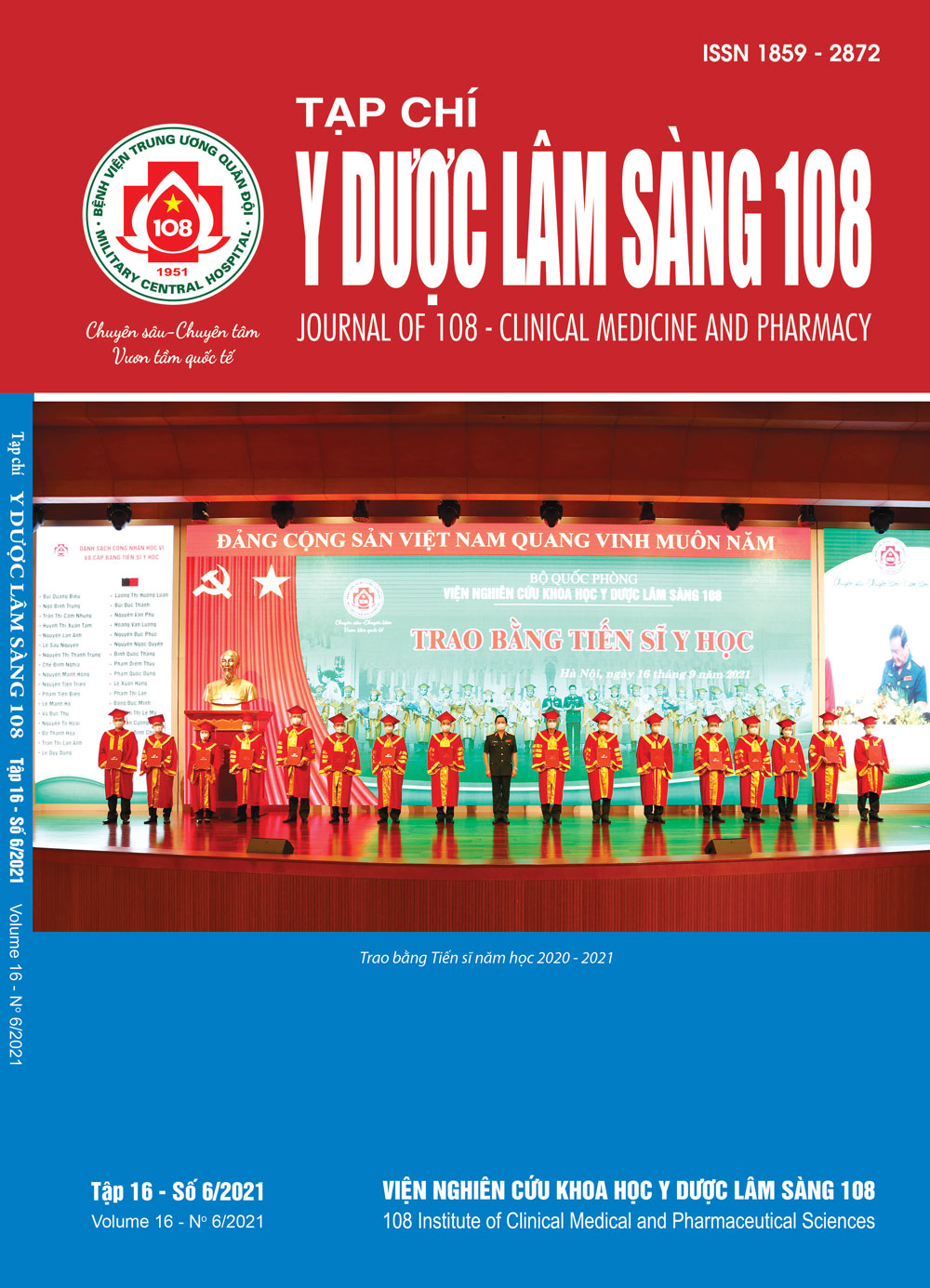Evaluation of the results of treatment for ischemic heart disease by cardiac shock wave therapy
Main Article Content
Keywords
Abstract
Objective: To evaluate the results of treatment of ischemic heart disease by cardiac shock wave therapy. Subject and method: A prospective, cross-sectional study with comparison and follow-up for 6 months on 50 ischemic heart disease patients with refractive angina pectoris according to criteria of ESC 2013 managed at Internal Cardiology Department of the 108 Military Central Hospital from January 2017 to January 2020. Treated by ESWT with the application of 100 shocks/spot at 0.09mJ/mm2 energy flux density for 3 - 6 spots each time, with three times per week at each series for three series at 1, 5, 9 weeks. The following parameters will be evaluated including symptoms of angina and the exercise tolerance, breathlessness, echocardiography and myocardial perfusion imaging after 6 months. Result: The symptoms of angina improved significantly (amount of chest pain 5.87 ± 2.7 to 0.28 ± 0.45 times; using of nitroglycerin reduced per week from 6.3 ± 3.5 to 0.3 ± 0.5 tablets/week). The 6-minute walking test all improved (278.1 ± 71m compared with 390.5 ± 42.3m), the Borg scale from 4.64 ± 1.44 to 1.82 ± 1.0. CCS angina class was significant CCS 3 (66% to 4%), CCS 4 (6% to 0%). In the group with heart failure, NYHA grade improved significantly (NYHA III from 40.7% to 11.1%, NYHA II from 51.9% to 33.3%). Pro-BNP decreased (994.99 ± 1708.9 to 429.0 ± 453.9pg/ml). EF Simpson's after treatment (50.5 ± 10.33%) was higher than before treatment (43.3 ± 11.99%). Wall motion septal index (WSMI) decreased from 1.49 ± 0.22 to 1.24 ± 0.12). GLS improved from -9.79 ± 2.68 to -12.7 ± 2.42. The rate of hypokinesia reduced from 98% to 80% with p<0.05. Average score of SSS (15.78 ± 9.25 versus 11.54 ± 7.7); SRS (11.0 ± 8.45 versus 8.39 ± 6.77), SDS (4.78 ± 2.83 versus 3.02 ± 1.83), markedly improved with p<0.05. The percentage of perfusion defect decreased from (25.66 ± 14.93 compared to 16.82 ± 11.46%). The degree of severe perfusion defect and the wide perfusion defect area decreased significantly after treatment by 52% to 12% and 58% to 28%, respectively. There was no rise of cardiac enzymes and complicated arrhythmias were not observed during the study period. Conclusion: The treatment of ischemic heart disease by cardiac shock wave therapy has obvious efficacy and high safety.
Article Details
References
2. Conrado I (2019) Shock wave therapy improves myocardial blood flow reserve in patients with refractory angina: Evaluation by real-time myocardial perfusion echocardiography. J Am Soc Echocar 32: 1075-1085.
3. Alunni G, Barbero U, Vairo A, D'Amico S, Pianelli M, Zema D, Bongiovanni F, Gaita F (2017) The beneficial effect of extracorporeal shockwave myocardial revascularization: Two years of follow-up. Cardiovascular Revascularization Medicine 18: 572-576.
4. Čelutkienė J et al (2019) The effect of cardiac shock wave therapy on myocardial function and perfusion in the randomized, triple-blind, sham-procedure controlled study. Cardiovasc Ultrasound 17(1): 13.
5. Lother Faber, Pliver Lindner (2014) Echo-guied extracorporeal shock wave therapy for refractory angina improves region myocardial blood flow and longgitudinal segmental left ventricular function. ESC Congress 2014, Barcelona, Spain.
6. Medispec (2006) Operating Manual CS2X400. Germantown, Maryland, USA.
7. Prasad M et al (2015) Extracorporeal shockwave myocardial therapy is efficacious in improving symptoms in patients with refractory angina pectoris - a multicenter study. Coronary Artery Disease 26(3): 194-200.
8. Nirala S, Wang Y, Peng YZ, Yang P, Guo T (2016) Cardiac shock wave therapy shows better outcomes in the coronary artery disease patients in a long term. Eur Rev Med Pharmacol Sci 20(2): 330-338.
9. Takakuwa Y, Sarai M, Ozaki Y (2017) Extracorporeal shock wave therapy for coronary artery disease: Relationship of symptom amelioration and ischemia improvement. Asia Ocean J Nucl Med Biol 6(1): 1-9.
10. Vainer J, Habets J, Schalla M, Lousberg A (2016) Cardiac shockwave therapy in patients with chronic refractory angina pectoris. Neth Heart J 24.
11. Wang Yu Peng Yunzhu, Yang Ping, Cai Hong Yan, Tao Siming (2014) Extracorporeal cardiac shock wave therapy (CSWT) for treatment of coronary artery disease in China. Glosal Jounals Inc 14(4): 21.
 ISSN: 1859 - 2872
ISSN: 1859 - 2872
